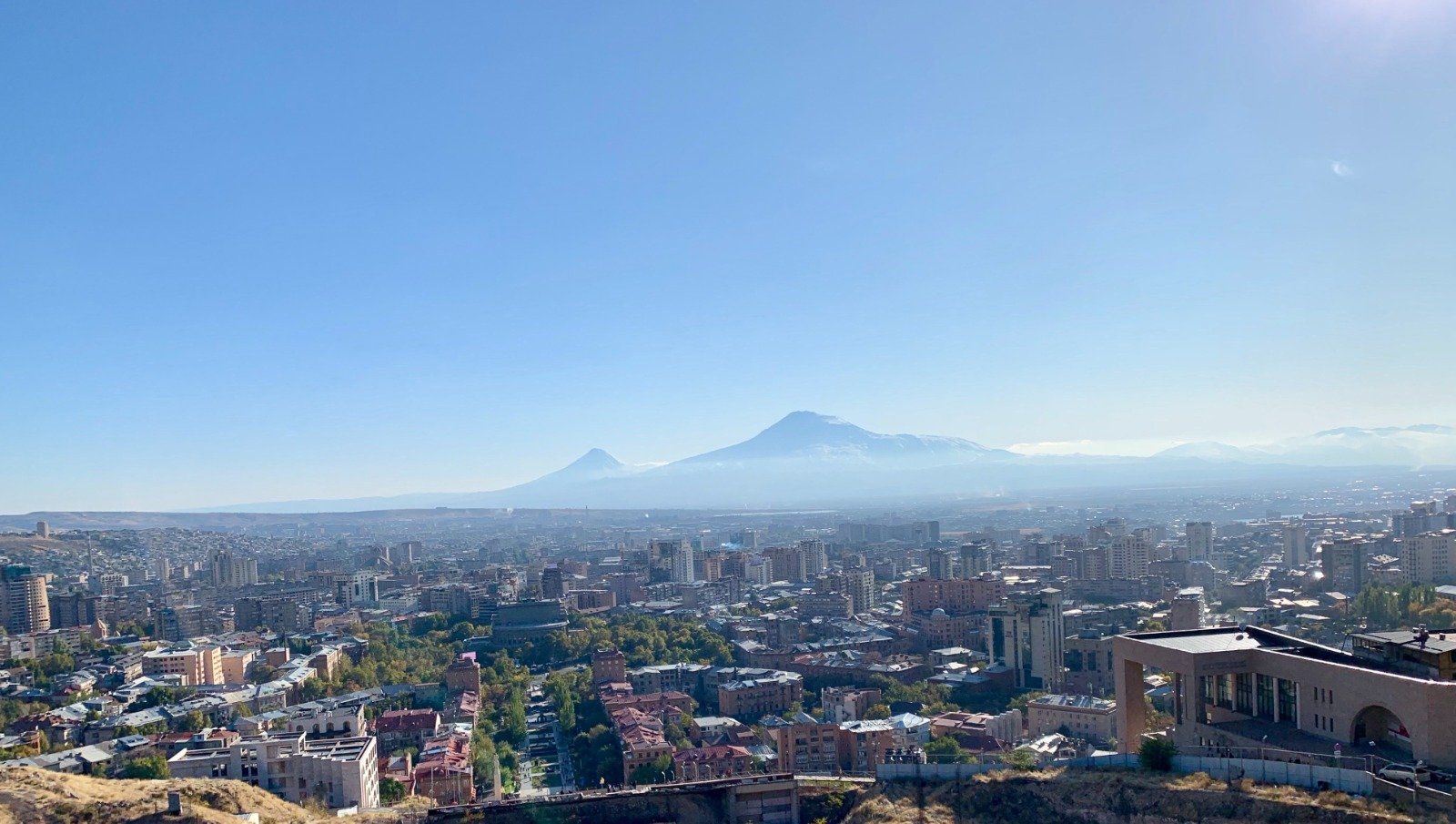
Events Calendar
Share your event on our calendar:
How Shifts to Veganism Can Help Avert a Climate Catastrophe
You are cordially invited to a Zoom discussion of “How Shifts to Veganism Can Help Avert a Climate Catastrophe.”
I am organizing this event because it is increasingly apparent that the world is rapidly approaching a climate catastrophe, shifts toward veganism are essential to efforts to avert it, and there is very little time left to make the changes necessary to reduce the threats.
The event will be from 1 PM to 2:30 PM US Eastern time (8 to 9:30 PM Israeli time)on October 27, as part of the Green Sabbath Weekend. The event will be recorded and released on November 1, World Vegan Day.
Event link
Richard Schwartz, email: veggierich@gmail.com
more info:
https://www.jvs.org.uk/my-life-as-a-vegetarian/professor-richard-schwartz
Nature Poetry in Gleisdreieckpark (Berlin)
Come join us in Gleisdreieckpark to read nature poetry together as the day draws to a close. For a few hours we will celebrate, honor, and enjoy the ancient practice of sabbath (shabbat), a weekly day of rest, a weekly Earth Day. Part of the green sabbath weekend sponsored by the Green Sabbath Project, please gather with us as the sun sets to slow down, relax, breathe, take notice, express gratitude, and get in touch with our world and ourselves. Bring a favorite poem of yours, if you like, even one you wrote yourself. (No epics, please.)
Afterward, all are invited to sit at Tor Eins or another of the park’s cafes for mingling and conversation. Socializing with family and good friends is another vital component of sabbath/shabbat.
Hosted by:
Jonathan Schorsch Professor, Jewish Religious and Intellectual History, Universität Potsdam Founder and director, the Green Sabbath Project
and
Claudia J. Ford Professor of Environmental Studies, SUNY Potsdam Midwife, Ethnobotanist, Artist
Saturday, 26 October 2024 15:00 – 17:00 We will meet here, at the Sportfläche info@greensabbathproject.net
Cook and Rest
Cook and Rest: A Perfect Sunday on the Hill
Why not spend your Sunday with good company, a delicious meal, and a moment of rest? Join us for a cozy afternoon where we'll gather to cook a warm soup together, then relax by the sea, at the stunning meeting opint of blue and green on the hilltop. Bring your own ingredients and as the saying goes, "everyone can add their own flavor to the soup." After we enjoy our meal, we'll take in the breathtaking view and unwind in nature.
Location: Prinkipo Monastery Hill, Prinkipo Island. Time: 3:00 - 6:00 pm
Hosted by Chef Alex Erkunt, Istanbul.
Alex Manukian aleks.erkunt@gmail.com +90 530 875 37 30
Yoga with Plants
Yoga with Plants -- A Journey of Growth and Harmony
Join us for a unique and inspiring experience where we connect with nature and our inner selves. In this special session we will plant seeds and sapling, symbolizing the cycle of life, growth, and renewal. Together we will form a circle around our newly planted saplings, visualizing how they, like us, will grow strong and thrive. Let's embrace the harmony between nature and body as we flow through a rejuvenating yoga practice.
Location: Yeraz Park, Yerevan (Armenia) Time: 1:00 pm Organized by photographer Liliya Zaydulina.
Liliya Zaydulina lilyaz9@gmail.com
Autumn Meditative Shabbat Walk
Enjoy a leisurely Shabbat morning walk, an invitation to slow down and spend time connecting to the woods, water, sky and birds and the Breath of All Life. On this Shabbat when we read the first Creation story, we’ll take time to consider our place in the Universe as we pause to connect to nature and Jewish tradition through prayer, readings, reflection and personal meditation. This event will be led by Rabbi Katy Allen, is supported by the Combined Jewish Philanthropies and is part of the Green Sabbath Weekend.
Ma'yan Tikvah: A Wellspring of Hope
Suggested non-member donation $10/person or $25/family
Oct 26, 2024, 10:30 AM – 12:00 PM
Wayland, Wayland, MA 01778, USA
Click here to RSVP
Event link
Everyday Fairytale: Workshop
“Everyday Fairytale” is a project initiated by artist Kinga Kiełczyńska and artist/researcher Ernst Logar. The project explores how changes in energy sources could reshape everyday life.
Fairy tales, with their mythical and psychological depth, guide us through crises and inspire change. "Everyday Fairytale" uses this format to imagine life after the transition to sustainable energy. What would this new, more regenerative lifestyle look like? By “lifestyle,” we mean the choices people make in their daily lives: what they eat, how they travel, how they spend their free time, how they manage their finances, and what values they hold.
What kinds of cultures will emerge from new forms of regenerative energy sources?
Friday, 18th October, we will hold a workshop in Warsaw with a small group of experts in social transformation. In the tradition of old debates, representatives from art, architecture, sustainable business, law, and activism will collaboratively create a scenario for an “Everyday Fairytale”—a speculative fantasy about how the world could look in 100 years if we respect the climate and implement social and economic solutions that uphold climate dignity.
Gathering with Day Schildkret
Artist/activist Day Schildkret will present a mini slide show to introduce folks to his unique and beautiful artwork and then we will transition to a conversation about his ethos of release and rest.
To register for the Gathering with Day, click here.
Day Schildkret is internationally renowned as the author, artist and teacher behind the Morning Altars movement, inspiring tens of thousands of people to make life more beautiful and meaningful through ritual, nature and art. BuzzFeed calls his work, "a celebration of nature and life."
With nearly 100K followers on social media and sold-out workshops, installations, trainings, and public speaking events worldwide, Day is a thought-leader devoted to healing the culture by teaching people to ritualize the big and small moments of our work and our lives.
Day is the author of Hello, Goodbye: 75 Rituals for Times of Loss, Celebration and Change (Simon Element), which hit #1 on Amazon for two days straight, as well as the author of Morning Altars: A 7-Step Practice to Nourish Your Spirit through Nature, Art and Ritual (Countryman Press).
Day has taught workshops and created installations at Google, The 9/11 Memorial Plaza, The Hammerstein Ballroom, The Andy Warhol Foundation, California Academy of Sciences, Esalen, and many others. His work has been featured on NBC, CBS, Buzzfeed, Vice, Well+Good, My Modern Met and four times in Spirituality & Health Magazine.
Gathering with Kate Soper
Environmental Crisis: death knell for the planet or unprecedented opportunity?
The environmental crisis is very threatening, but it also provides an opportunity to move beyond unsustainable - and in many respects unpleasurable - ways of working and consuming and to open ourselves to the attractions of a less growth-driven existence. If richer societies were to accept a less expansionary, more reproductive material style of living in exchange for more free time and cultural and recreational provision for enjoying it then the worst abuses of the environment can be corrected, runaway global warming can be kept in check, and exploitation and inequality, within the nation state and globally, can begin to be more effectively addressed.
Kate Soper is Emeritus Professor of philosophy, having taught at Sussex University, University of North London, and author of [Post-Growth Living: For an Alternative Hedonism][1] (2020).
To register for the Gathering with Kate, click here. [1]: https://www.versobooks.com/products/929-post-growth-living
Peace & Prejudice: getTogether for Green Sabbath
Peace & Prejudice: getTogether for Green Sabbath I 15.10. I 15-16:30 o‘ clock I Gleisdreieckpark
In a world enriched by its diversity, it's crucial that we come together to address the challenges that affect us all. On Sunday, we invite you to an open and interactive dialogue. We want to explore the extent to which we can rely on our assumptions and expectations and how presuppositions, social peace and environmental protection are connected.
To register, visit https://forms.gle/De8TWCNZSJ5nUxENA. It’s open to everyone.
The exact place in the park, where the event will take place, will be sent to you via mail, after you registered.
If you have any questions, please don't hesitate to reach out to us: coexister.berlin@gmail.com We are looking forward to seeing you there!
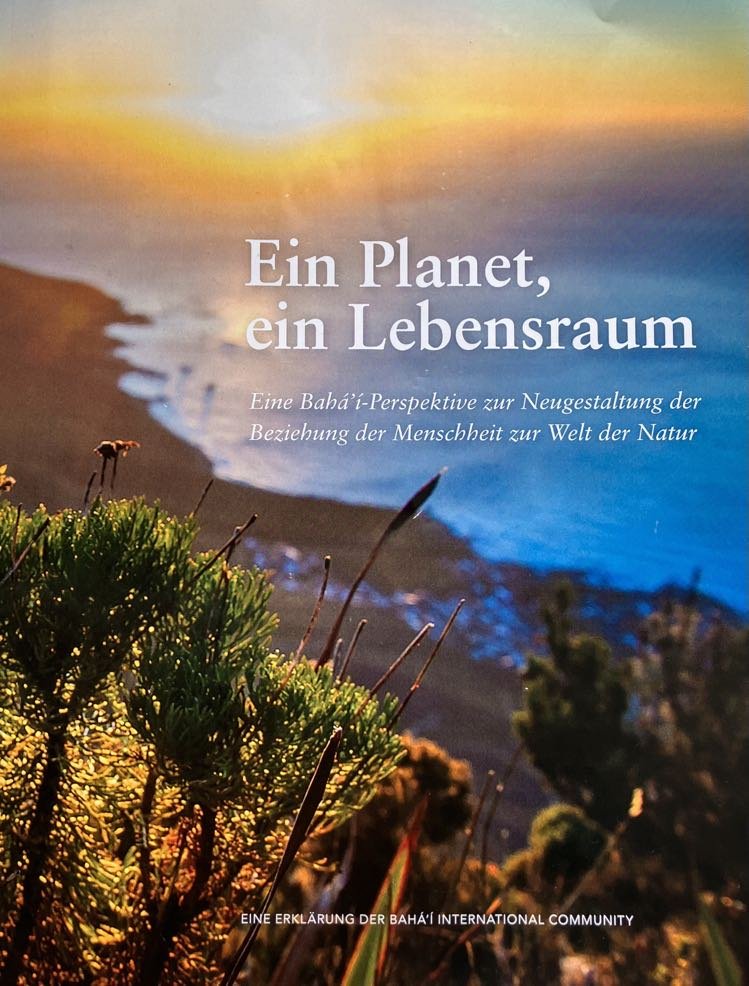
Recitation of the Bahai prayer for Unity
We cordially invite you to gather with us in the picturesque Park Sanssouci at 5 pm, where we will embark on a spiritually enriching journey. The heart of our event will be the recitation of the Baháí prayer for Unity in both English and German, underscoring our commitment to fostering unity and understanding across diverse cultures and languages.
To infuse the evening with an extra layer of enchantment, a talented opera singer will take the stage to deliver the evening prayer in Hebrew, creating a transcendent musical experience that resonates with our souls.
As twilight descends upon the park, we will transition into a tranquil meditation and devotional session. Surrounded by the park's natural beauty, this will be an opportunity to reconnect with our inner selves and reflect on the world around us.
During the devotional portion, we will engage in meaningful conversations about the concept of "Heimat" – a German word that embodies the sense of home and belonging. This discussion will encourage us to explore the multifaceted meanings of "home" and its broader implications in our increasingly interconnected world.
Join us for an evening of unity, prayer, music, meditation, and enlightening dialogue as we explore the depths of our souls and contemplate our place in a world where unity and harmony are needed now more than ever. This event is an exceptional opportunity to be part of a unique gathering that celebrates diversity, fosters spiritual connection, and addresses critical questions about our relationship with our environment. Don't miss this chance to be part of a transformative experience in the heart of Park Sanssouci.
Contact:
Elke Zastrow
Özlem Karakus, 0176 65911574, oezlem.karakus.manukyan@uni-potsdam.de
Awareness, Consumption and Climate Change Workshop
In this seminar, we will look at our lifestyles and behavioural patterns that are harmful to the earth and especially to the climate. The first step is to visualise information about the impact chains of our consumption behaviour. In a reflexive process, we deal with a deeper understanding of the individual reasons for our behaviour. Why do we, as actually "rational" people, destroy our own living space? What understanding and awareness have we lost? What really makes us happy? We will discuss these questions in small groups and compile in plenary how we can live in a climate-friendly and at the same time happy way. The seminar will end with a meditation. We see the basis for taking a public stand and becoming active in being a practical example of how we can live in an environmentally and climate-friendly way. If we live what we demand, this gives us a lot of inner security and the strength to speak about it publicly. It is important that we regularly take the time to question ourselves and become more mindful. In the seminar we will look at the causes and solutions of environmentally harmful lifestyles. Everyone will be given time to answer basic questions for themselves and then discuss them with other participants. In this sense, the seminar is meant to deepen & clarify knowledge, views and inner attitudes.
Seminar leaders:
Niranjan Mukherjee was born in Mumbai, India, and grew up in the United Arab Emirates. After studying biotechnology in Bangalore, he moved to Germany to do his Master's degree in hydroscience. He worked as a research assistant at the Department of Environmental Microbiology at TU Berlin and is currently working in the Science and Technology Section of the Indian Embassy Berlin. He has been studying and practising Raja Yoga with the Brahma Kumaris since 2013.
Dr Helmut Wagner studied political science at the Ludwig Maximilian University in Munich. He received his Ph.D. in 2013 for his basic philosophical research in the field of sustainability. He currently works for the Directorate of the City of Munich, where he is responsible for a municipal policy area. He has been studying and practising the teachings of Raja Yoga since 2005.
Organiser and venue:
Brahma Kumaris Raja Yoga e.V., Sigmaringer Straße 13, 10713 Berlin-Wilmersdorf
U-Bhf. Fehrbelliner Platz, subway station Blissestrasse buses: 101, 104, 115, 249, 310
www.brahmakumaris.de/berlin T. 030-781 30 59
Bewusstheit, Konsum und Klimawandel
In dem Seminar schauen wir uns unsere Lebensstile und Verhaltensstrukturen an, die der Erde und insbesondere dem Klima schaden. Dabei geht es zunächst darum, uns Informationen über Wirkungsketten unseres Konsumverhaltens zu vergegenwärtigen. In einem reflexiven Prozess beschäftigen wir uns damit, die individuellen Gründe unseres Verhaltens tiefer zu verstehen. Warum zerstören wir als eigentlich “vernunftbegabte” Menschen unseren eigenen Lebensraum? Welches Verständnis und Bewusstsein ist uns abhanden gekommen? Was macht uns wirklich glücklich? Wir werden in kleinen Gruppen über diese Fragen diskutieren und im Plenum zusammentragen, wie wir klimafreundlich und gleichzeitig zufrieden leben können. Das Seminar endet mit einer Meditation. Die Grundlage dafür, öffentlich Stellung zu beziehen und aktiv zu werden, sehen wir darin, selbst ein praktisches Beispiel dafür zu sein, wie wir umwelt - und klimafreundlich leben können. Wenn wir selbst leben, was wir fordern, gibt das enorm viel innere Sicherheit und die Stärke öffentlich darüber zu sprechen. Wichtig dabei ist, dass wir uns regelmäßig die Zeit dafür nehmen, uns selbst immer wieder zu hinterfragen und dadurch achtsamer zu werden. In dem Seminar werden wir uns mit Ursachen und Lösungen von umweltschädlichen Lebensstilen auseinandersetzen. Jeder bekommt Zeit, sich selbst grundlegende Fragen zu beantworten und diese dann mit anderen Teilnehmenden zu diskutieren. In diesem Sinne ist das Seminar als Vertiefung & Klärung von Wissen, Ansichten und inner Haltungen gedacht.
Seminarleitende:
Niranjan Mukherjee wurde in Mumbai, Indien, geboren und wuchs in den Vereinigten Arabischen Emiraten auf. Nach seinem Studium der Biotechnologie in Bangalore zog er nach Deutschland, um seinen Master in Hydrowissenschaften zu machen. Er arbeitete als wissenschaftlicher Mitarbeiter am Fachgebiet Umweltmikrobiologie der TU Berlin und ist derzeit im Wissenschafts- und Technologiebereich der Indischen Botschaft Berlin tätig. Er studiert und praktiziert Raja Yoga mit den Brahma Kumaris seit 2013.
Dr. Helmut Wagner studierte Politikwissenschaften an der Ludwig-Maximilians-Universität in München. Seinen Ph.D. erhielt er 2013 für seine philosophische Grundlagenforschung auf dem Gebiet der Nachhaltigkeit. Er arbeitet derzeit für das Direktorium der Landeshauptstadt München und verantwortet dort einen kommunalpolitischen Aufgabenbereich. Er studiert und praktiziert die Lehren des Raja Yoga seit dem Jahr 2005.
Veranstalter und Veranstaltungsort:
Brahma Kumaris Raja Yoga e.V., Sigmaringer Straße 13, 10713 Berlin-Wilmersdorf
U-Bhf. Fehrbelliner Platz, subway station Blissestrasse buses: 101, 104, 115, 249, 310
www.brahmakumaris.de/berlin T. 030-781 30 59
Loving the Earth, Cultivating a Global Consciousness
Shiur by Rabbi Prof. Bradley S. Artson, Dean of the Ziegler School of Rabbinic Studies at the American Jewish University and the Zacharias Frankel College at the University of Potsdam: Loving the Earth, Cultivating a Global Consciousness.
Rabbi Artson will discuss different sources in Hebrew and in the English translation (from the TaNaKh, the Talmud, Midrashim, the Rambam and other commentators) that touch on our relationship to the planet.
Location: Synagogue Oranienburger Str.
Please RSVP to office@frankel-edu.de
Shiur / Study Circle with Jonathan Schorsch
After prayers on Saturday morning, Prof. Dr. Jonathan Schorsch will lead a study group in which we will think about the tree of life, consider shabbat (sabbath) as an ecological practice, and read some poems by Nelly Sachs.
Saturday, 14.10
~13.00
Open to everyone
Kabbalat Shabbat / Welcoming Shabbat
The Green Sabbath Project
Kabbalat shabbat prayers (welcoming the sabbath)
This prayer service was created in the 16th century by kabbalists in Safed, who also welcomed the sabbath by going to the local orchards and fields. Much of the service is made up of Psalms filled with nature imagery. We are hoping to do this prayer service outdoors (weather permitting). The prayers will be conducted in a particularly ecstatic, neo-hasidic (Carlebach) style.
Friday, 13.10
18.00
Tempelhofer Feld (exact location tbd)
Open to everyone
Circular Dances
Circular Dances
with Felix Ruckert and Phonoschrank
In the frame of the Berlin-wide GREEN SABBATH project the IKSK will offer a space of silence, reflection and collective non-doing, interwoven with a practice of minimal collective dancing.
At every full hour, Phonoschrank will offer a 20-minute White Noise meditation, followed by a 40-minute phase of meditative movement in cybernetic sounds.
Felix Ruckert will choreograph a series of simple circular dance especially for the occasion. The dances will be slow and minimal, sometimes even without almost any movement, the focus is on collaboration and listening. All dances are technically very easy and require no previous experience with dance or music.
Phonoschrank will guide your listening from meditation to movement, from the function ”White Noise” to a cybernetic sound synthesis algorithm, and from technical cybernetics to social cybernetics.
The IKSK pyramid will be open from 15 00 - 18 00, all welcome.
Entrance is free.
Felix Ruckert is a dancer, choreographer, conceptual artist and curator. He creates events, performs, gives lectures and teaches workshops, often fusing his knowledge from dance with an unique approach to practices of BDSM and conscious sexuality. He also enjoys making music. More: http://felixruckert.de.
Gathering with Kate Soper
Kate Soper is Emeritus Professor of Philosophy, having taught at Sussex University, University of North London, and author of Post-Growth Living: For an Alternative Hedonism (2020)
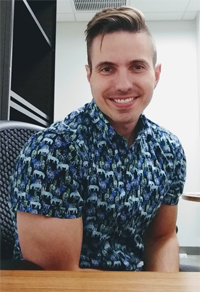
Gathering with Andrew Blosser
Andy will talk about his new book, The Ethics of Doing Nothing: Rest, Rituals and the Modern World (Orbis, 2022).
Register here.
Andy serves as Visiting Assistant Professor in the Theology Deptartment at Marquette University.
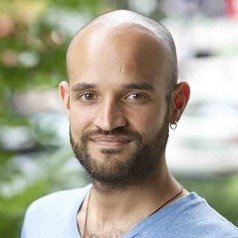
Gathering with Vivek Venkataraman
How did humans work and rest in the Palaeolithic? Ever since anthropologist Marshall Sahlins published *The Original Affluent Society*, it has been widely assumed that ancient people lived lives of leisure, working no more than 15 hours per week. New research in anthropology shows the story is more complex. In this talk I offer a critical re-assessment of original affluence and explore what the lives of hunter-gatherers today can tell us about what has gone wrong with modern work.
Register here.
Vivek Venkataraman is an Assistant Professor in the Department of Anthropology and Archaeology at the University of Calgary and founder of the Venkataraman Lab in Human Evolutionary Energetics.
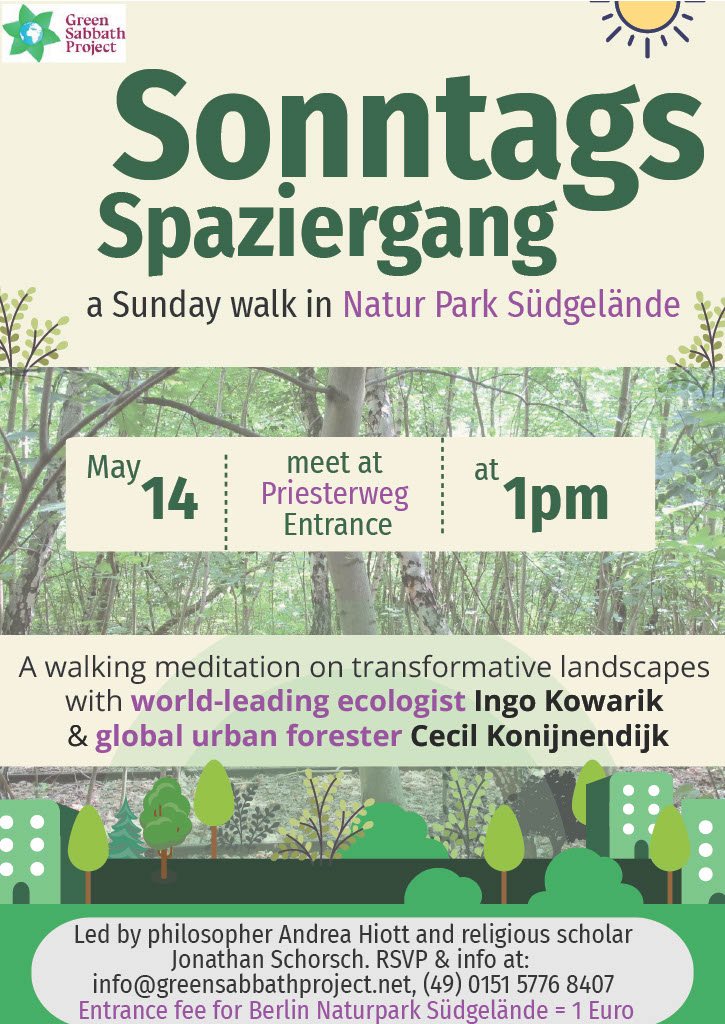
Sonntags Spaziergang
A Sunday walk in Natur Park Südgelände, Berlin, a walking meditation on transformative landscapes with world-leading ecologist Ingo Kowarik and global urban forester Cecil Konijnendijk, led by philosopher Andrea Hiott and scholar of religion Jonathan Schorsch. RSVP & info at: info@greensabbathproject.net, (49) 0151 5776 8407. Entrance fee for Berlin Naturpark Südgelände = 1 Euro.
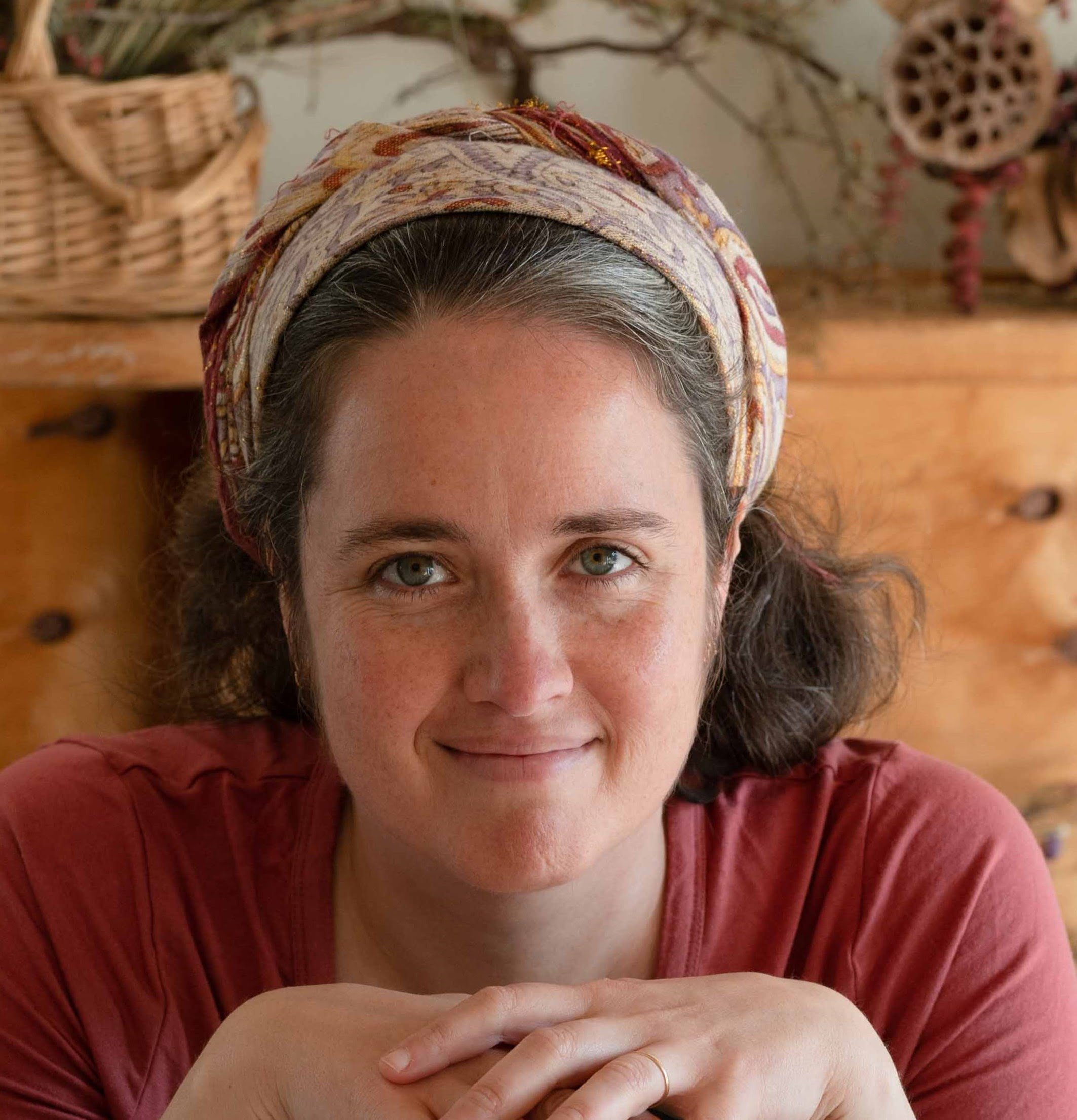
Gathering with Naama Sadan
Naama will discuss some of the teachings of Yemima (Yemima Avital, 1929-1999), a beloved spiritual leader in Israel. Within her neohasidic and psychodynamic “method,” Yemima emphasized resting al mekomi (in one’s place), that waiting is an action, and that actions should always be small. Naama will then lead some writing exercises based on these.
Register here.
Naama is a PhD Candidate in the Department of Geography and the Advanced School of Environmental Studies at The Hebrew University of Jerusalem
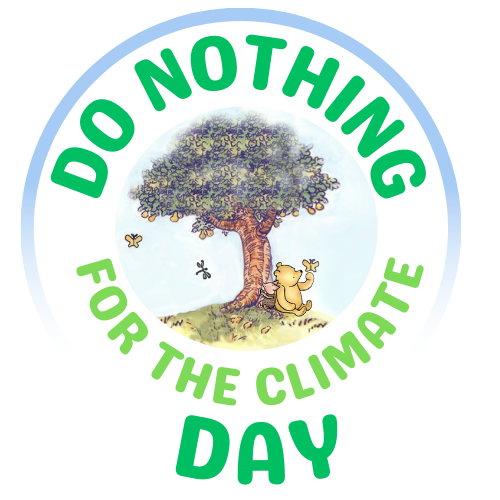
A Gathering with Erik Assadourian and #DoNothingfortheClimateDay
Today we're witnessing two converging crises: the climate crisis and the mental health crisis. At the root of both is a culture that celebrates growth, consumerism, individualism over balance, stewardship, and community.
Join Erik Assadourian as he discusses the very made-up holiday of #DoNothingForTheClimateDay, now on its third year! The idea of this day--balanced between the very active Earth Day and World Environment Day (on the second Thursday of May)--is to simply do nothing. Not strike, protest, nor even pick up trash, but simply rest: read a book, take a walk, spend time with loved ones, meditate, and best of all: go to bed early. In the process of slowing down, you'll heal both yourself and the planet (as you use less on that slower day than you typically would).
Register here.
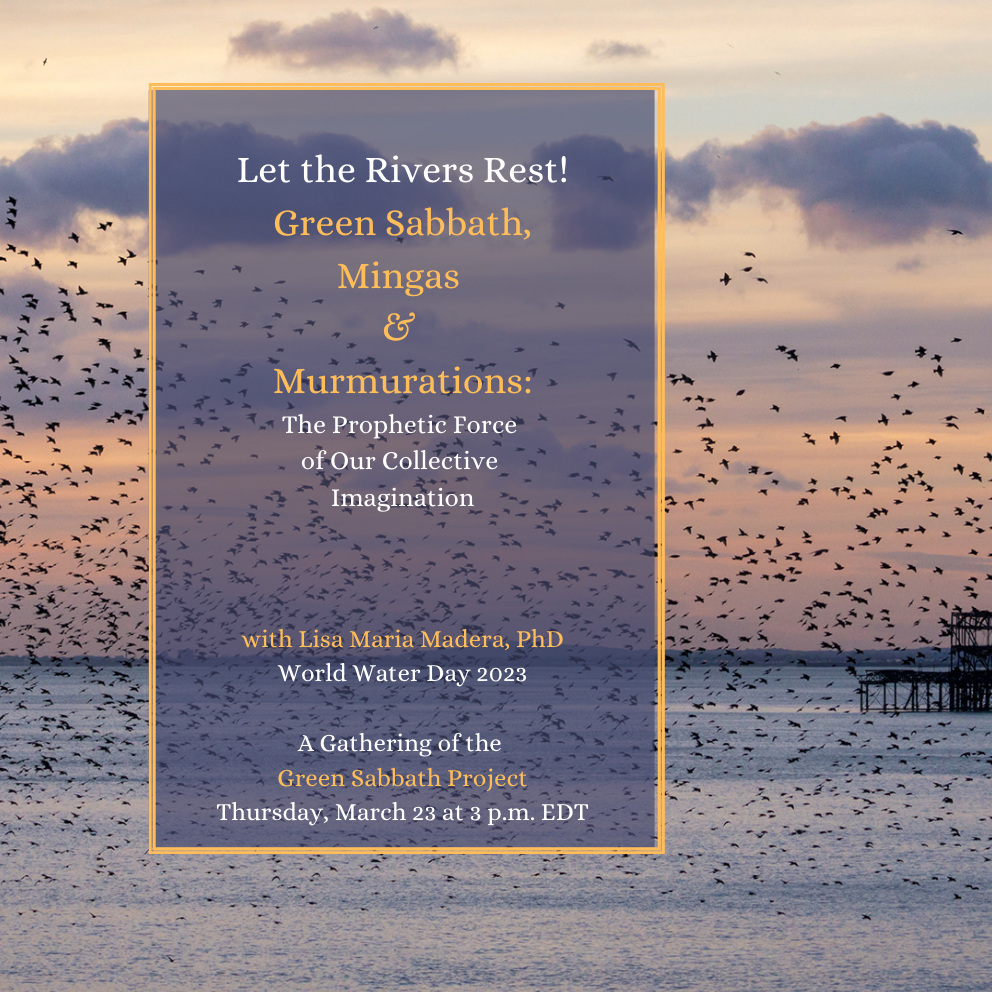
Green Sabbath, Mingas & Murmurations - A Gathering
Join us for a Green Sabbath World Water Day Murmuration on Thursday, March 23rd at 3:00 pm EDT hosted by Lisa Maria Madera to explore how we might activate our collective imagination in favor of the Earth.
You can register for the gathering here.
In Let the Rivers Rest! Green Sabbath, Mingas and Murmurations: The Prophetic Force of Our Collective Imagination Lisa María will share her story and the story of how the Colectivo Rescate Río San Pedro in Quito, Ecuador uses mingas to heal rivers.
The minga is an Andean ancestral social technology that strategically draws on individual talents to reach communal goals. The Incas used mingas to create their extensive roads and famous water irrigation systems. In contemporary Ecuador, mingas continue to play an important role in forging solidarity, as we can see in this description of mingas in the Amazonian community of Sarayaku.
In Quito, the Colectivo Rescate Río San Pedro has activated the charismatic and powerful social force of the minga on behalf of the San Pedro River.
Inspired by the communal dream of being able to swim in this beloved local river together, over the course of a little more than a year, the Colectivo has organized over 11 mingas to remove over 10 tons of plastic from the San Pedro River. Joy-filled and educational, the mingas attract people of all ages, weaving community and inspiring people to use their gifts on behalf of the river.
Through strategic alliances, the Colectivo has attracted support from schools and universities, businesses, local governments, and social organizations. For World Water Day 2023, the Colectivo has partnered with Ecuador's Ministry of the Environment and with Waterkeeper Alliance expanding the river mingas to 7 provinces throughout Ecuador and 7 countries in Latin America celebrating together the First Latin American Minga.
Join us on Thursday, March 23rd at 3:00 pm EDT.
Register for the gathering here and come dream alongside us!
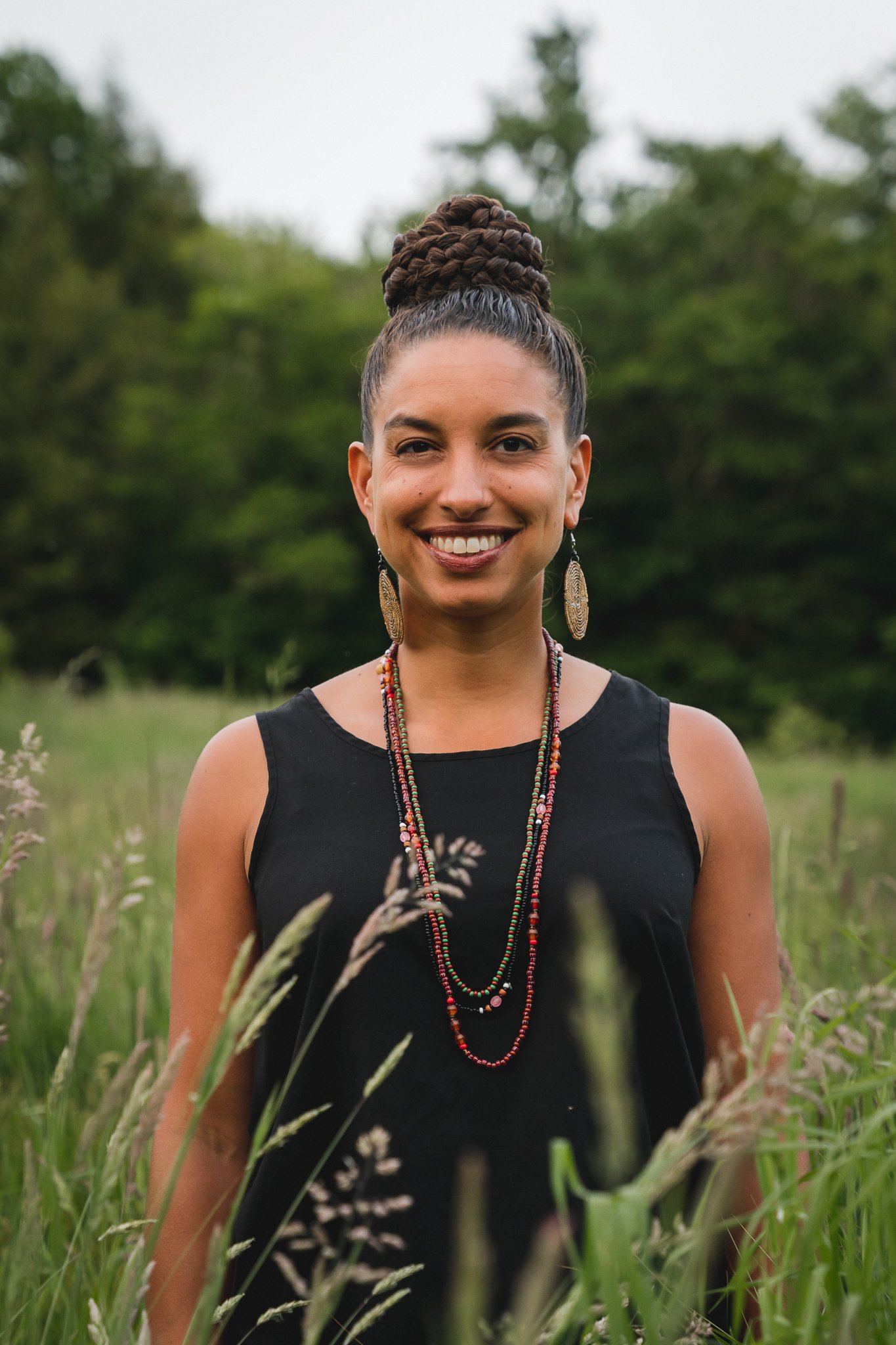
Leah Penniman
Black Earth Wisdom: Afro-Ecological Survival Strategies
“I love to think of nature as unlimited broadcasting stations, through which God speaks to us every day, every hour.” ~Dr. George Washington Carver, Tuskegee University, 1887
The Queen Mothers of Kroboland, Ghana admonished their Black American students in disbelief, “Is it true that in the United States, a farmer will put the seed into the ground and not pour any libations, offer any prayers, sing, or dance, and expect that seed to grow?” Met with ashamed silence, they continued, “That is why you are all sick! Because you see the earth as a thing and not a being.”
Ecological humility is part of the cultural heritage of Black people. While our 400+ years immersion in racial capitalism has attempted to squash that connection to the sacred earth, there are those who persist in believing that the land and waters are family members, and who act accordingly. In Black Earth Wisdom, Leah Penniman weaves together the lessons from today’s most respected Black environmentalists, those who have cultivated the skill of listening to the lessons that Earth has whispered to them. Together, we embark on a sensory journey through Black ecological thought.
In this time, we are acutely aware of the fractures in our system of runaway consumption and corporate insatiability. We feel the hot winds of wildfire, the disruptions of pandemic, and the choked breath of the victims of state violence. We know there is no going back to “normal.” The path forward demands that we take our rightful places as the younger siblings in creation, deferring to the oceans, forests, and mountains as our teachers.
Those whose skin is the color of soil are reviving their ancestral and ancient practice of listening to the Earth to know which way to go. As Dr. Carver explained, “How do I talk to a little flower? Through it I talk to the Infinite. And what is the Infinite? It is that silent, small force… that still small voice.”
Leah Penniman is a Black Kreyol farmer, author, mother, and food justice activist who has been tending the soil and organizing for an anti-racist food system for 25 years. She currently serves as founding co-ED and Farm Director of Soul Fire Farm in Grafton, New York, a Black & Brown led project that works toward food and land justice. Her books are Farming While Black: Soul Fire Farm's Practical Guide to Liberation on the Land (2018) and Black Earth Wisdom: Soulful Conversations with Black Environmentalists (2023). Find out more about Leah’s work at www.soulfirefarm.org and follow her @soulfirefarm on Facebook, Twitter and Instagram.
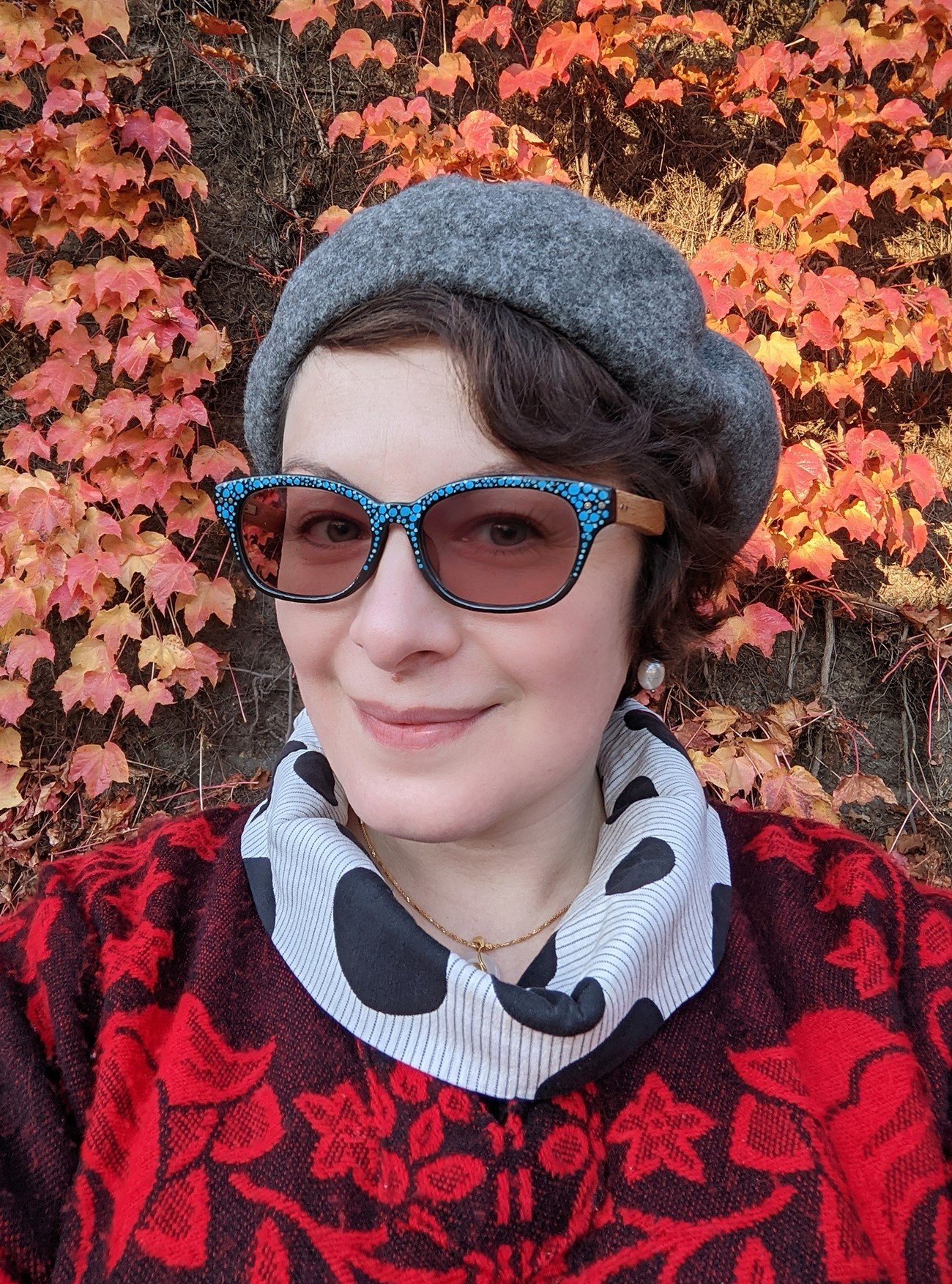
Boróka Bó
The Surprising Ways in Which Downtime Matters for Your Well-Being
Dr. Boróka Bó is currently an Assistant Professor at the University of Essex in the UK. She uses both qualitative and quantitative methods to study the repercussions of time availability. Her work shows that individuals living in differing socioeconomic contexts experience time very differently, and that time availability is a significant contributor to well-being. Socioeconomic circumstances even shape how children experience time, both in their families and in schools.
By the end of her talk, you will learn that the data does in fact show that ‘doing nothing is one of the best things you can do”, for your health, for your community, and for your environment. This is partly because time is more than just a resource to be tracked. We make time, but at the same time, time also makes us who we are. In other words, we live in time while making time together. This makes time a jointly co-constructed social and individual experience. This means that not having enough time can be contagious. This matters, because when we catch time poverty, we lose the ability to grieve and love and to be fully present in the lives of those we care about.
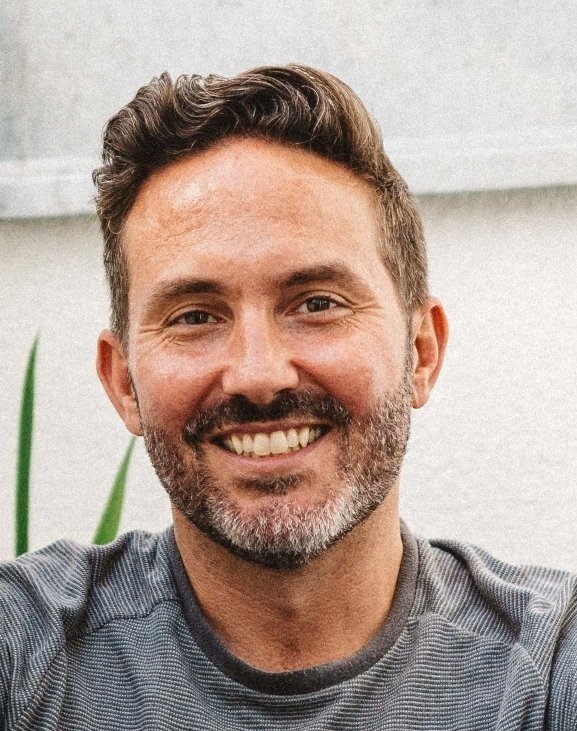
Whitney Bauman
The Time of Progress and the Times of the Planet
During the covid pandemic (now endemic) many people experienced a different sense of time than that of the 24 hour GMT. This is a good starting point for understanding and experiencing non-chronological time (or the time of progress). Many religious traditions and rituals help to focus us on alternative understandings of time: sabbath practices, meditation, yoga, and rituals that involve psychoactive substances, just to name a few. It is also the case that chronological time does not map on to human embodied experiences of the world, nor that of other earth bodies. Might we turn the “slow down” into an opening for experiencing planetary times: the times of seasons, of rivers, of forests, and of other animals on the planet? Perhaps such thinking and acting can help us to mitigate the problems caused by the current climate crisis.
Whitney Bauman is Associate Professor of Religious Studies at Florida International University in Miami, FL. He is also co-founder and co-director of Counterpoint: Navigating Knowledge, a non-profit based in Berlin, Germany that holds public discussions over social and ecological issues related to globalization and climate change. His areas of research interest fall under the theme of “religion, science, and globalization.” He is the recipient of a Fulbright Fellowship and a Humboldt Fellowship. His publications include: Religion and Ecology: Developing a Planetary Ethic (Columbia University Press 2014), and co-authored with Kevin O’Brien, Environmental Ethics and Uncertainty: Tackling Wicked Problems (Routledge 2019). He is currently working on a manuscript tentatively entitled, Developing a Critical Planetary Romanticism: CPR For the Earth.
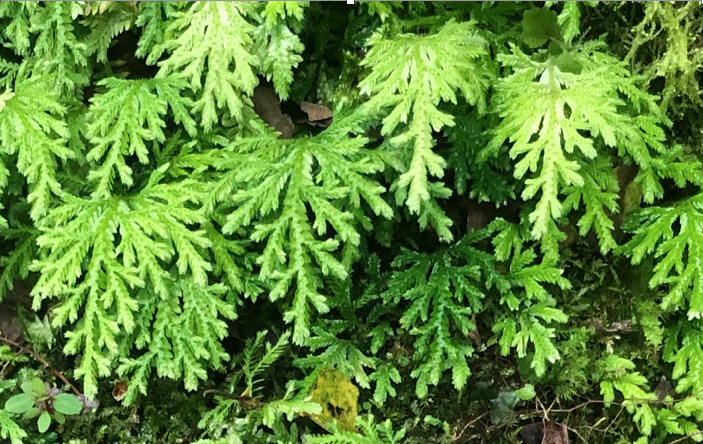
Green Sabbath Weekend
On October 20 through 23rd, join us for an international Green Sabbath Weekend featuring events in multiple cities hosted by friends and allies around the world. The Green Sabbath Weekend accompanies the end of the current shmita or sabbatical year.
If you, your family, friends, community or organization would like to host an event, please let us know! If you are already hosting an event that is in alignment with our Green Sabbath vision and mission, let us know!
We would like to include you and amplify your work and projects in support of the Earth.

Earth Hospice with Trebbe Johnson
How do we make beauty in times of crisis?
On Thursday, September 15 at 15:00 ET Trebbe Johnson will guide us in a profound reflection on the meaning and ritual practice of Earth Hospice.
Johnson writes:
“The Earth is in grave danger. Climate change is advancing—and it is already here. Together we take a deep collective breath and say, Yes, the Earth as I know it is dying.”
“The Earth itself is not dying, of course. This planet has remade itself countless times over its four-and-a-half billion-year lifespan and will do so again. But something very dear to us humans is dying, and that is our relationship with the seasons, plants, animals, and waters as we know and love them.”
“What kinds of attention can we give to our feelings of grief and fear? What ceremonies can we create? How do we make beauty in a time of crisis?”
Trebbe Johnson is the author of Radical Joy for Hard Times: Finding Meaning and Making Beauty in Earth's Broken Places, and three other books, as well as many articles and essays that explore the human bond with nature and myth. She is also the founder and director of the global community Radical Joy for Hard Times, devoted to finding and making beauty in wounded places. Her new book, Fierce Consciousness: Surviving the Sorrows of Earth and Self, will be published in March 2023. She lives in Ithaca, New York.
You can read more about her work here: https://trebbejohnson.com/
And you can register in advance for Thursday's gathering here:
https://uni-potsdam.zoom.us/meeting/register/u50tc--rqTIqHdGQZdtsbtzw4EGQtgjFHlrN
After registering, you will receive a confirmation email containing information about joining the meeting.
We look forward to connecting with you and reflecting on how we might practice Earth Hospice together!

Green Sabbath Gathering with Marilyn Paul
Friday, July 29, 12:00 EST
Marilyn Paul
Author, An Oasis in Time: How a Day of Rest Can Save Your Life Management consultant
Register for the event: https://uni-potsdam.zoom.us/meeting/register/u5csfuispzMsH9MpEKJKTGC_CN0lQMtKyD4O
Shabbat is a rich inheritance in the Western spiritual tradition. It is one that has become increasingly valuable to help us meet the challenges of a 24/7 world. We will begin this session with a reminder of the profound value of Shabbat observance. We will then look at the mindsets and cultural demands that keep us on the go. We will explore a multitude of ways to “Stop” which is the root meaning of the Hebrew word Shabbat and why stopping is so important for greening our lives. Finally, we look at five gateways to deepen our Shabbat observance, in whatever ways we observe Shabbat at present. Even if you don’t keep Shabbat in any way now you might find ways to join in that are right for you.
Marilyn Paul is an expert on time management and well-being. She helps people find their path to balancing the inner, intuitive spaciousness of oasis time with the pleasures and efficacy of getting the right things done. Marilyn is the author of An Oasis in Time: How a Day of Rest Can Save Your Life (Rodale, 2017) and It’s Hard to Make a Difference When You Can’t Find Your Keys named a best book of the year by Spirituality and Health Magazine. In “Oasis” Marilyn describes the path to a day off each week for what you love, and often don’t get to, including deep rest. This rhythm of life leads to profound transformations in well-being and efficacy. In “Keys”, she shares her pioneering model for making the journey from being disorganized and mismanaging time to a far more powerful life of being “organized enough” to go after your cherished dreams. With a Ph.D. from Yale and an M.B.A. from Cornell, Marilyn takes a unique approach that blends inner work and practical skills training. Her work has been featured on national media including National Public Radio, the Chicago Times, the Boston Globe, USAToday and CNN.

Green Sabbath Gathering with Jane Davidson
Jane Davidson
Author, #futuregen: Lessons from a Small Country Former Minister for Environment, Sustainability and Housing, Wales Author, the Well-being of Future Generations (Wales) Act, 2015
Green Sabbaths: Is the word “sabbath” too religious for most people?
Register for the event: https://uni-potsdam.zoom.us/meeting/register/u5wpduCoqzItGNf6Zsefh9VkX5oPPdFAFIxR
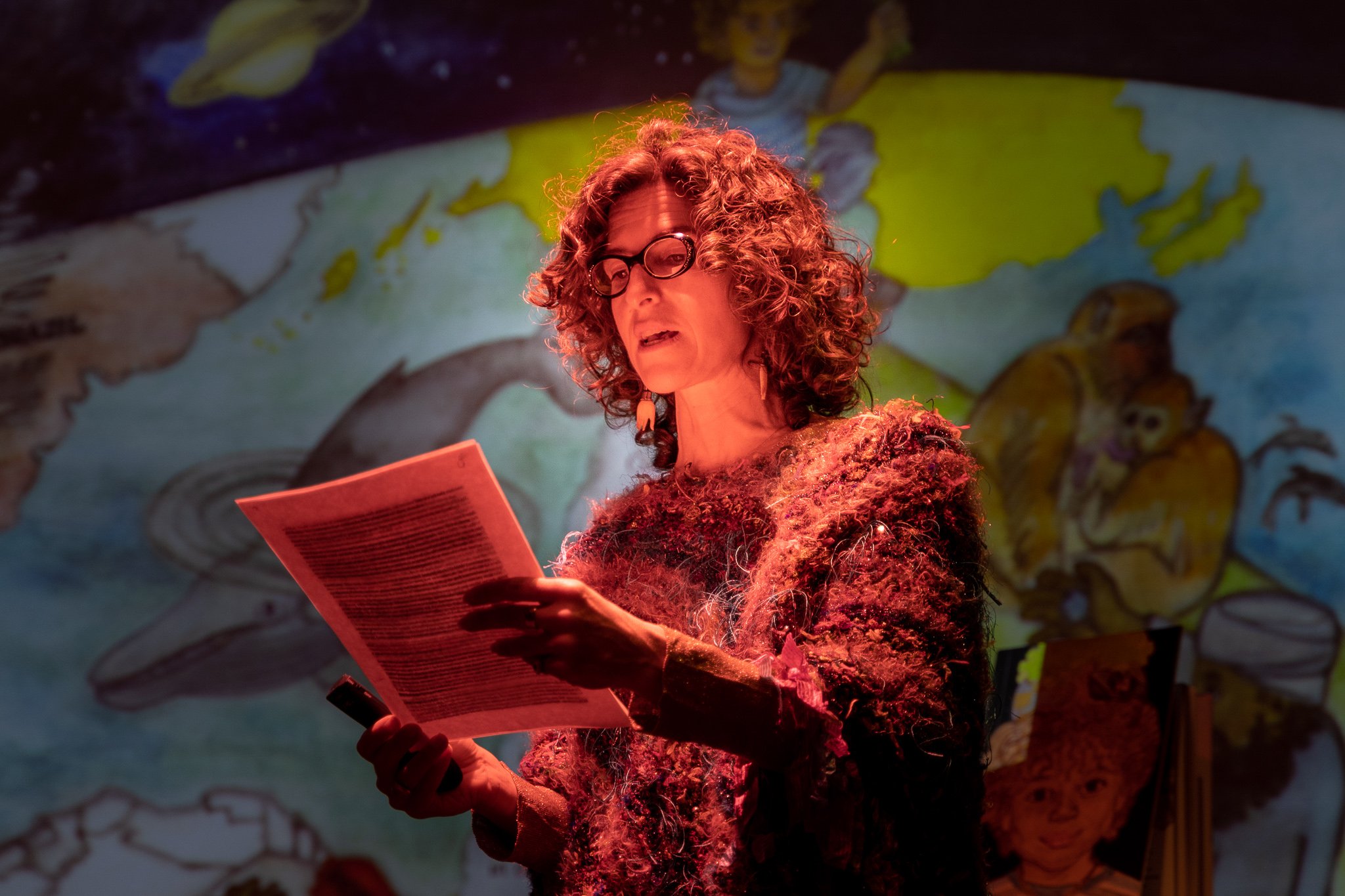
Earth Day Performance of “Indigenous Wisdoms, Reclaimed Action: Love Lessons from Zazu Dreams”
Cara Judea Alhadeff, PhD
Performance of “Indigenous Wisdoms, Reclaimed Action: Love Lessons from Zazu Dreams”
Dr. Alhadeff's presentation is part of the four day Harvard Divinity School's Program for the Evolution of Spirituality Inaugural International Conference on Ecological Spiritualities
Friday, April 29, 2022
12:30-1:30 EST
https://harvard.zoom.us/j/98401443299?pwd=SDBlV2xuVS9SbnhJbGtseVQvWWVtQT09
As a resolution to current environmental crises, this interfaith, environmental-justice performance is intended to illuminate intersections between ancient Middle Eastern spiritual-pharmacopeia rituals (specifically Sephardic and Arab-Jewish) in relation to their agricultural and architectural environmental-engineering practices. While encouraging individuals and communities to collectively resist industrialized convenience-culture and its self-destructive consequences, this action-based academic performance offers behavioral and infrastructural design shifts that embody Middle Eastern Semitic indigenous wisdom/spiritual intelligence. I explore principles found in ancient Judaic and Islamic texts and laws as antidotes to our consumer-waste culture: water politics/infrastructure, architectural heating/cooling, the sacred embodied in bioregional agricultural systems, medico-magical rituals, and zero-waste/creative-waste living.
Dr. Cara Judea Alhadeff has published dozens of books and essays on eco-justice, globalization, spirituality, philosophy, performance-studies, and ethnic studies. In numerous museum collections, her photographs/performances have been defended by freedom-of-speech organizations. Former professor at UC SantaCruz and Global Center for Advanced Studies, Alhadeff teaches, performs, and parents a creative-zero-waste life:
www.carajudea.com / www.zazudreams.com
A preview is available here: https://www.youtube.com/watch?v=KiCyZmomVJM





